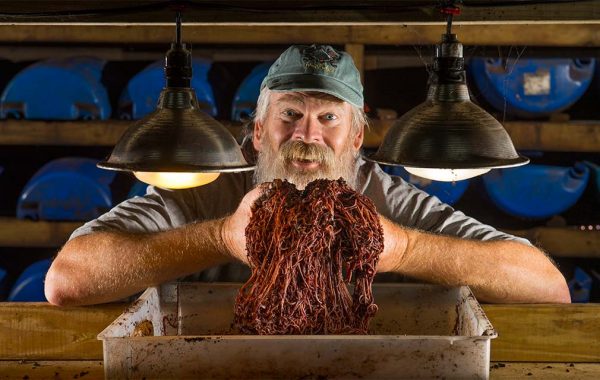How Jim Shaw ’83 wormed his way up to the top of his field
Jim Shaw ’83 has gone from a self-described bookworm at Colgate to a worm farmer in south-central Pennsylvania. With lessons learned from late nights studying in the Delta Upsilon fraternity house and sweat equity earned through long days of turning soil, Shaw has built a successful business. Uncle Jim’s Worm Farm has become “one of the most recognizable brands in American vermiculture,” the Washington Post noted recently.
It’s helped that Shaw has a lifelong familiarity with the slippery creatures. As the child of a fisherman in Waterbury, Conn., Shaw picked nightcrawlers from the soil around his home and sold them for 40 cents a dozen. “I put a sign in the yard, and next thing I knew, I started paying people to pick them, a penny a piece,” Shaw recounted. “Soon, I had the whole neighborhood picking.”
By high school, Shaw’s business acumen had become apparent. He began shipping in worms from Canada — “If you want to sell trout worms in any volume, they have to come from Toronto,” he said — and selling them for 70 cents a dozen. “I upset quite a few people, because I had to jump my price,” Shaw said with a laugh.
After Colgate, Shaw worked a management job in the trucking industry for 20 years. That whole time he sold worms on the side, eventually advertising in magazines aimed at fishermen and, increasingly, organic gardeners. Slowly, his market began to shift entirely toward customers using worms not as bait, but as custodians of high-quality soil. “The ‘go green’ surge in the mid-2000s really helped the business,” Shaw said.
These days, Uncle Jim’s Worm Farm offers more than 50 products online — like “worm tea” (a residue of worm-inhabited soil), composters, and organic pesticides — aimed at organic growers and gardeners. “You can’t get anything more natural than a worm,” he said. “It’ll put back into the soil everything that the soil needs to produce the best plant you can get.”
Shaw’s worms have been featured on the Oprah Winfrey Show and in the Wall Street Journal. He attributes his competitive advantage to his entrepreneurial and logistical grasp of the worms-by-mail market. “We’ve more or less mastered how to mail the worms,” said Shaw. “That in itself is one of the trickiest things, to sell somebody a live product and guarantee it live, when it’s traveling 3,000 miles.”
At the same time, Shaw has been harvesting another product: Division I football linemen, which is what caught the attention of the Post. His oldest son, Jimmy, played defensive lineman at Penn State, followed soon after by John, who played four years at right tackle for the Nittany Lions. Their younger brother, David, is now on the defensive line of the University of Maryland Terrapins.
The linemen’s athleticism runs in the family, beginning with Shaw at Colgate. But growing up on a farm has helped the next generation prepare for the demands of Big Ten football. “They really didn’t need barbell strength,” he said. “They already had the farm strength in them when they showed up to college.”
As they’ve wrapped up their college football careers, Shaw’s sons have been returning home to carry on the family business. John now runs the nitty-gritty farming side, while Jimmy manages sales and marketing. Shaw’s daughters Ann and Mary also work on the business side of the operation. (Shaw and his wife, Patricia, have eight children.)
“It’s not easy work, but we enjoy it,” Shaw said of the worm-digging lifestyle. “It’s something that we’re able to do as a family. It’s fun.”
— Mike Agresta







